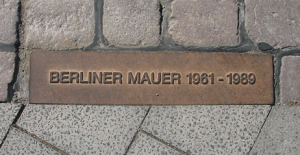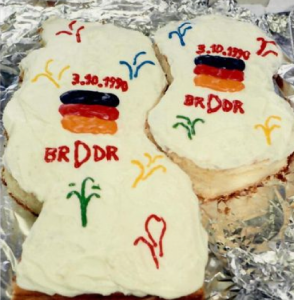
Marlena Voigts, Hamburg
Nov. 9, 1989: I was lying in bed when I thought I heard the phone ring. The next morning, there was in fact a message on my answering machine from about 3 a.m. “Hi Marlena! You won’t believe where I am. (Pause) I’m in the West, at my Aunt’s house in West Berlin! It’s just unbelievable!”
I almost dropped the receiver. West Berlin? Uwe, an aspiring journalist at the East German Berliner Zeitung, whom I’d met in June 1988 at the main department store at Alexanderplatz in East Berlin? Uwe, my ‘forbidden contact’ in WEST Berlin? Impossible! I listened to his message again – and again – and again. It just couldn’t be true. What an incredible night. And a friendship that exists up to this very day.

I baked this cake for my students at Syracuse University, N.Y., on the first official German Reunification Day, just one year after the wall which separated East and West Germany fell.

Andreas Hübner, Hamburg
I still have vivid memories of the fall of the wall. At the time, we were living in newly developed Neu-Hohenschönhausen, a communist-style district of prefabricated buildings in East Berlin. My birthday had just passed, and I was looking forward to celebrating a perfectly fine November birthday party on the weekend. However, I had made my plans without Mr. Schabowski and his well-remembered press conference on Thursday, November 9, where he announced that the border crossings would be open immediately. The day after, four out of five kids I had invited to my party on Saturday cancelled out on me. Supposedly, some aunts and uncles had also invited them over. O well. But since the party was definitely going to take place, my parents and I did not give way to despair and, on Saturday, found ourselves on the streets of West Berlin celebrating with what seemed a million other people. Now wasn’t that a birthday party to remember.

Michaela Keck, Oldenburg
I was an au pair in England and still settling in. In fact, it was not until the morning of November 10, 1989, that I learned about it. I attempted – unsuccessfully – to get some breakfast into the little girl I was looking after. The parents thought it would be easier to get some food into her with the television on, and when I saw the news footage of people climbing the wall and celebrating all around it, it took me some time to comprehend what was going on. In the middle of an English breakfast room, the scenes on TV looked positively surreal.
That same evening, our teachers at school asked us Germans about the future of a unified Germany. We all answered the question with cautious optimism. However, watching the fall of the Berlin Wall from abroad made its symbolical and historical significance very powerful.

Christoph Strobel, Lowell, MA
I often think of the turbulence of 1989 and the early 1990s. In my final years at a Gymnasium in southwestern Germany, I traveled to Poland and what was then East Germany. There I talked to people who had participated in the resistance. These encounters brought home that individuals, when they work together, can bring about change. In addition, during a visit to Auschwitz, a guide pointed to an assortment of spoons on the ground in Lager 2, explaining that each one symbolized a person whose life had been destroyed in the death camp. It struck me at that time that when we deal with phenomena, such as genocide, mass violence, or repression, we often tend to focus on the anonymity of numbers or the abstractness of large destructive processes. In my teaching, I often draw from these realizations by attempting to humanize and individualize suffering, by underscoring regular people’s ability to commit heinous acts, but also by reminding my students that they can actively work for a better world, just as people have done in the past.

Roger L. Nichols, Tucson, AZ
Even though it happened thirty years ago, I still vividly remember seeing parts of the wall come down. Our son and I were sitting in front of the TV, watching the early evening news when the screen showed people climbing over the wall and later driving their Trabbies through the open gate. He asked if the event was a surprise, and I told him that I had never expected it to happen in my lifetime. Our family benefitted directly because in 1997, I received a Fulbright appointment to the Universität Halle-Wittenberg, and we got to see the massive rebuilding of eastern cities once the old regime had collapsed.
21,854 Total Views, 10 Views Today






